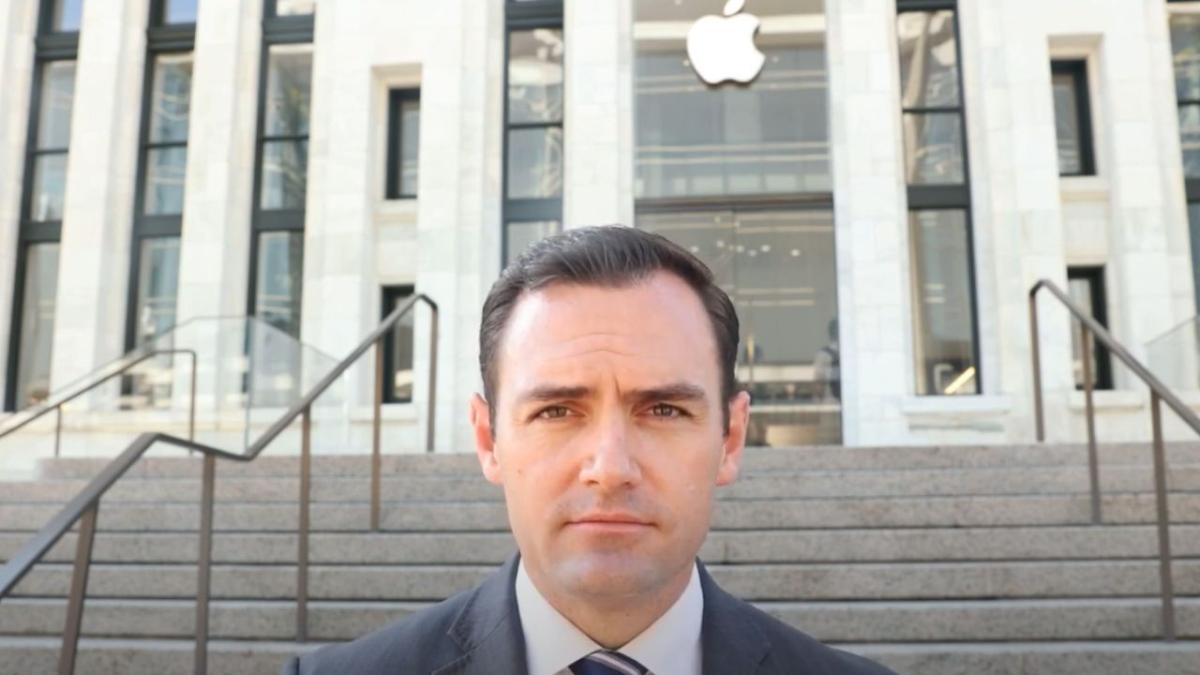|
WASHINGTON, D.C. -- Chairman Gallagher today announced that he will nominate Peng Lifa for the Nobel Peace Prize on the anniversary of his one-year historic protest against Xi Jinping and the Chinese Communist Party’s authoritarian rule. In the video above, the Chairman highlights Apple’s role in choking off the protests that Peng Lifa inspired.
On October 13th, 2022 Peng Lifa, aka “Bridgeman” unfurled two banners over Sitong Bridge in Beijing. The banners read "We don’t want Covid Tests, we want food. We don’t want Cultural Revolution, we want reform. We don’t want lockdowns, we want freedom. We don’t want an autocrat, we want votes. We don’t want lies, we want dignity. We are citizens, not slaves.”
Peng Lifa's act of courage led to the largest protests in China since Tiananmen Square – which helped to end the CCP’s draconian COVID lockdowns. Many protestors used Apple’s AirDrop function to bypass authoritarian censors – which Apple then limited after receiving pressure from the Chinese Communist Party. Chairman Gallagher calls on Apple to be transparent about its actions during these protests and to stand up for human rights around the world.
Click HERE to watch Chairman Gallagher’s video statement nominating Peng Lifa for the Nobel Peace Prize or read his written remarks below.
Click HERE to download the video.
--
I want to tell you a story about courage and cowardice.
October 13th, 2022. A man in Beijing wakes up before the chilly dawn. His fellow citizens in China have spent two years welded into their homes, locked in quarantine camps, and living under a darkening techno-totalitarian shadow.
The man dons a disguise—bright orange overalls, a yellow hard hat— checks that the paint has dried, rolls up the long strips of fabric. Xi Jinping will consolidate absolute power at the 20th Party Congress in just a couple days.
Does he have second thoughts? He’s crazy enough to think he’ll change the world, but he must know he won’t be coming home again.
He makes his way to Sitong Bridge over Beijing’s bustling Third Ring Road. He’ll only have a few minutes. Sparks get stomped fast. But he looks down at the rush hour traffic and sees dry kindling.
He unfurls two banners across the overpass. “We don’t want Covid Tests, we want food.
We don’t want Cultural Revolution, we want reform. We don’t want lockdowns, we want freedom.
We don’t want an autocrat, we want votes. We don’t want lies, we want dignity. We are citizens, not slaves.”
Cars slow down. Phones are whipped out.
The man on the bridge lights a fire. Thick black smoke billows upwards. Could he still save himself if he ran? It doesn’t matter. He’s not going to run.
The authorities descend, disappear the man on the bridge, stomp out the fire he’s set. That’s the end of it, they think.
But they haven’t put out the fire. Not nearly.
Just a few days later, on the Shanghai subway, an AirDrop notification pings on a woman’s phone.
It’s a picture of a banner spread across Sitong Bridge. We don’t want lies, we want dignity. She looks up. Everyone with an iPhone in the subway car is staring at the same thing. Emails, texts, WeChats can all be tracked. AirDrop can’t. The fire is roaring.
Back in Beijing, within the Chinese Communist Party, there’s panic. Protests are starting. The greatest mass surveillance system ever devised is flashing red. But they know who to call.
In 1997, a struggling California-based computer company released an advertisement that would vault into marketing lore:
“Here’s to the crazy ones,” the charismatic founder narrates, “the misfits, the rebels, the troublemakers, —…because the ones who are crazy enough to think that they can change the world, are the ones who do.”
B-roll of Martin Luther King, Jr., Muhammed Ali, and Ghandi, plays. “Think Different,” the final frame implores.
That struggling computer company, Apple Inc., went on to become the most valuable company in the world, running 95% of the supply chain for its iPhone through China.
But in Beijing, twenty-five years later, “thinking different” is a problem.
Apple rolls out an update in November. Suddenly (and only within China) AirDrop is severely restricted.
No one knows who made the call, but Apple’s AirDrop update has helped choke off the protests.
It’s time for Apple to come clean. At a moment when the world cried out for bravery, why bend the knee?
Apple owes the truth to Bridge Man, as democracy activists call him in a nod to Tiananmen Square’s “Tank Man.” He has a name. Peng Lifa. He has a family. He’s disappeared.
Luckily, the “prairie fire” Bridgeman started was already too large for Apple’s update to stop. His words inspired the White Paper protestors, the largest pro-freedom protests in China since Tiananmen Square. Together they took on Xi Jinping and ended the tyrannical Zero-Covid lockdowns. They won.
Apple has another famous ad campaign “Shot on an iPhone,” where the company puts ordinary users’ extraordinary photos up on billboards around the world. Follow Bridgeman’s courageous example. Put images of his banner up around the world.
Today, I’m nominating Peng Lifa for the Nobel Prize. The world needs to hear his story, one, I fear, Apple doesn’t want you to hear.
We don’t want lies, we want dignity.
|

